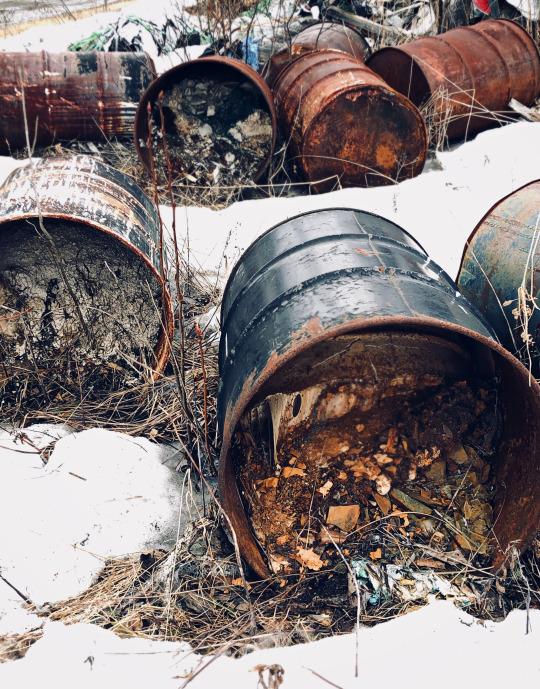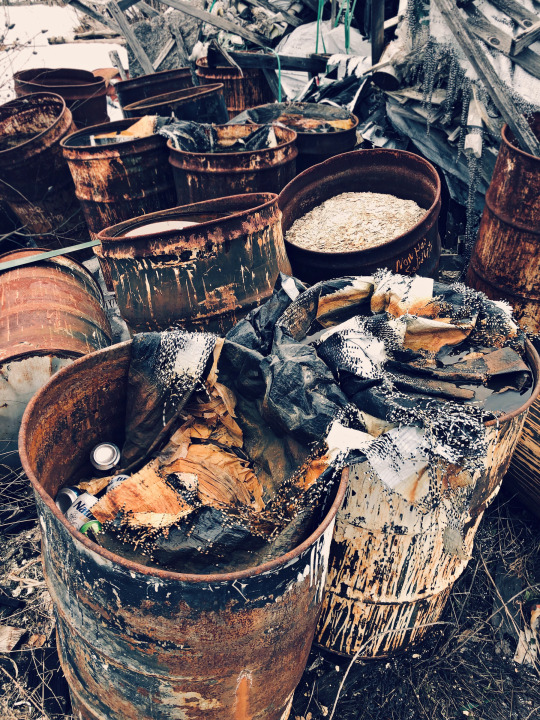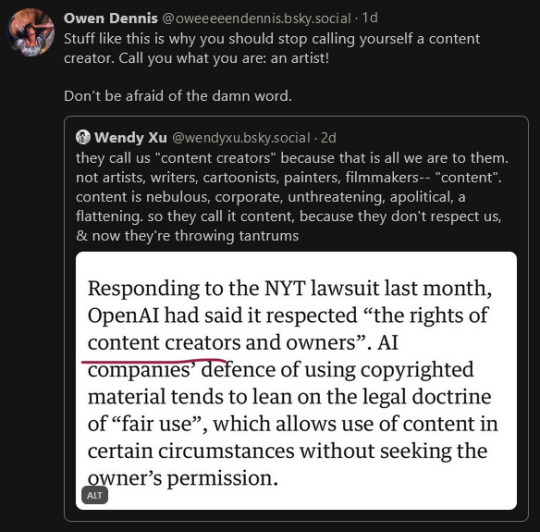#industrial waste
Explore tagged Tumblr posts
Text

107 notes
·
View notes
Text






It's rotton work.
49 notes
·
View notes
Text
Vegetable vendor Shivnarayan Dasana had never seen so many policemen descend on his village in the central Indian state of Madhya Pradesh. The 60-year-old lives in Tarapurin the industrial town of Pithampur, known for its automobile and pharmaceutical factories. The town has been tense since containers holding 337 tonnes of toxic waste from the site of one of the world's worst industrial disasters arrived for disposal three weeks ago. The waste, transported from the now-defunct Union Carbide factory in the city of Bhopal - site of the 1984 gas tragedy that killed thousands - has sparked fears among locals. They worry that disposing of it near their homes could be harmful and even cause an environmental disaster. Protests erupted on 3 January, a day after the waste arrived in the town, escalating into stone-throwing and attempted self-immolations. Since then, heavy police patrols near the disposal facility have turned Tarapur and surrounding areasinto a virtual garrison. The police have registered seven cases against 100 people since the protests began, but the townspeople continue to raise concerns about industrial pollution at smaller community meetings. The toxic waste cleared from the Bhopal factory included five types of hazardous materials - including pesticide residue and "forever chemicals" left from its manufacturing process. These chemicals are so-named because they retain their toxic properties indefinitely. Over the decades, these chemicals have seeped into the surrounding environment, creating a health hazard for people living around the factory in Bhopal. But officials dismiss fears of the waste disposal causing environmental issues in Pithampur.
continue reading
#india#pithampur#industrial waste#bhopal gas tragedy#pesticides#forever chemicals#heavy metals#water and soil pollution#health#environment#bhopal
2 notes
·
View notes
Text
2 notes
·
View notes
Text

Untreated industrial waste spews forth from a sewage pipe into the Buriganga River. The photo was taken from Dhaka's Shyampur area. — FE Photo
5 notes
·
View notes
Text
In western Alberta, Canada, near where the North Saskatchewan River comes down off the glaciers in the Rocky Mountains, there is a dam and a reservoir lake.
It’s a nice rest stop on camping trips, or on a drive through the mountains if you’re taking the slower route to British Columbia. There’s some hydroelectric generation. And some plaques from decades ago thanking the local indigenous people for “making room” for the Bighorn Dam and Lake Abraham.
If that’s your experience of the dam, you might think it was built for power. Or maybe to manage water supplies for irrigation further down on the prairies.
Partly it was. But a significant part of the justification for the dam was because in the winter the water flow in the North Saskatchewan River slowed substantially. A lot of the riverbed dried up and was exposed until the spring melt came. And at the time a lot of Edmonton’s waste (including sewage, but also offal from the extensive meat packing industry, and other industrial waste) was dumped in the river, to be carried down stream to be someone else’s problem.
In the winter, though, Edmonton couldn’t make it someone else’s problem. The water flow wasn’t enough to dilute it all. As the city and the industries grew, the river started stinking. All winter it would smell, until the flow picked up again in the spring.
So, they forced people to move. And they built a dam. All so that they could keep the water flowing in the river steadily enough to wash away the waste of a growing city.
You know, rivers catching on fire used to be a regular occurrence.
46K notes
·
View notes
Text
𝐔𝐥𝐭𝐫𝐚𝐟𝐢𝐥𝐭𝐫𝐚𝐭𝐢𝐨𝐧 𝐏𝐥𝐚𝐧𝐭 (𝐔𝐅 𝐏𝐥𝐚𝐧𝐭)
LARCO India Pvt Ltd. provides sophisticated Ultrafiltration Plant systems to improve water quality. With advanced filtration, energy efficiency, and space-saving design, we provide clean, dependable water for everybody.

#ultrafiltration#water filtration#industrial waste#waste water management#water recycling#water treatment plant#sustainability
1 note
·
View note
Text
Learn essential waste management practices for chemical manufacturing from A-Gas Electronic Materials. This guide covers waste minimisation, segregation, recycling, safe storage, and compliance. Enhance sustainability and efficiency in your operations.
#waste management#chemical manufacturing#waste minimisation#waste segregation#recycling#safe storage#regulatory compliance#hazardous waste#solvent recovery#A-Gas Electronic Materials#UK#sustainability#industrial waste#chemical waste disposal#waste treatment#environmental regulations
0 notes
Text


"content creator" is a corporate word.
we are artists.
#anti ai#fuck ai#artists on tumblr#please do not call me or any artist a content creator#i'm an artist. a fanartist. a designer. but not a content creator#ai clowns in my replies will be deleted and blocked without response so do not waste your breath#you are not an 'artist' for generating an image any more than you are a chef for ordering from a restaurant. someone Else did the work.#owen dennis just deleted all his blue sky stuff again and i hate that he does that because he makes such interesting comments#about the entertainment industry lmao i need to just. start screenshotting every smart thing he says#anyway thats why i decided to finally make this when its been sitting in drafts for a few months#owen dennis#edit - if you dont know who owen dennis is he's the creator of one of the best animated series of the last 20 years (Infinity Train)#he's very open about talking about art and the entertainment/animation industry on social media and in his newsletter and hes so cool 4 it
9K notes
·
View notes
Text
Nuclear reactors are obligated to pay into a government controlled trust fund for the duration of their operation. The purpose is that at the end of operation, that fund is used to handle decontamination, clean up, and deconstruction/demolition of the plant. That way the company cannot just "oopsy" away the obligation. Because they have been paying for the cleanup during the entire duration of the facility's lifetime.
I think all large industrial operations should have to do this. Mining, natural gas, chemical processes, manufacturing. Rather than simply requiring the owning company on the back end to pay for it, when you can simply dissolve the company, make them pay for it over the lifetime of the process. Enforce good stewardship throughout, rather than just at the end.
(There is, consequently, a whole thing around closed nuclear plants and people buying them to handle cleanup because they want access to that trust fund money. The Nuclear Regulatory Commission (NRC) handles oversight of at least the initial part where cleanup involves radioactive components and contaminants. That said, I don't feel qualified to speak about the oversight of the remaining cleanup as I'm not sure how much jurisdiction/oversight they have over cleanup once the nuclear component is handled. That said, the NRC is also one of the regulating bodies that actually has teeth, which are very sharp, so I tend to trust their oversight more than other groups.)


#nuclear regulation#industrial waste#i continue to believe that other industries and fields should be subject to similar requirements and expectations and nuclear reactors#because the regulations and requirements are just... common sense?#granted#nuclear is also the only industry where our regulation isn't written in blood#so maybe I'm asking too much of other fields
16K notes
·
View notes
Text
/PRNewswire/ -- Industrial Filtration Market is expected to reach USD 47.1 billion by 2029 from USD 37.1 billion in 2024 at a CAGR of 4.9% during the forecast period according to a new report by MarketsandMarkets™.
#industrial filtration#industrialization#industrial#energy#energia#power generation#utilities#utility#power plant#power plants#industrial wastewater treatment#industrial waste#wastewatertreatment#wastewater treatment#zero waste#waste management#filter press#bag filter#filtration#water filtration#oil and gas industry#enviromental
1 note
·
View note
Text
youtube
INDUSTRIAL WASTE - nobody cares (2023)
#cryin in the goth club#industrial waste#alternative#low-fi#post punk#goth#new music#2023 jams#Youtube
1 note
·
View note
Text
Commercial Waste Management Overview
Commercial waste management is a critical aspect of responsible business operations for national chains and large corporations.
Commercial Waste Overview Commercial waste management is a critical aspect of responsible business operations for national chains and large corporations. Additionally, efficient waste management not only ensures compliance with environmental regulations but also contributes to cost savings, resource conservation, and a positive public image. In this article, we provide an overview of commercial…

View On WordPress
#commercial waste#commercial waste management#compliance#cost reduction#efficient waste management#homedepo#industrial waste#lowes#national chains#recycling programs#resources#safety#target#walmart#waste collection
0 notes
Text
The Importance of Wastewater Treatment: Protecting Our Environment and Public Health
The importance of wastewater treatment cannot be emphasized, although it is a vital procedure that is frequently overlooked by the general population. It is essential to protecting the environment and the general public's health. This article examines the critical function of wastewater treatment in hyderabad and emphasizes the wide-ranging effects it has on our daily lives and the environment.
The wastewater challenge:
Wastewater is the used water that comes from households, places of business, and industrial waste and carries a variety of pollutants with it. This covers a wide range of substances, such as detergents and human waste as well as chemicals, heavy metals, and even medications. Wastewater can have severe effects on the environment if it is not treated, contaminating water sources, destroying aquatic habitats, and providing serious health hazards to people. There are many wastewater management companies in hyderabad that focus on cleaning this contaminated water.
Environmental safety:
Aquatic life can be severely hampered by the discharge of untreated wastewater into rivers, lakes, and oceans, which threatens aquatic ecosystem preservation. Algal blooms, fish kills, and the devastation of sensitive ecosystems are all possible outcomes of an excess of nutrients, diseases, and toxins. The advanced treatment of wastewater prevents harm to aquatic ecosystems.
Pollution prevention: When wastewater is properly treated, toxins and other pollutants are removed from the water, allowing it to be safely released back into the environment. This aids in keeping natural water sources clean so they are safe for use by humans and the ecosystems that depend on them.
Protecting Biodiversity: A lot of species rely on clean water to survive. We preserve the biodiversity of our world and keep ecosystems in balance by treating wastewater.
Protection of public health:
Disease prevention: Untreated pathogens in wastewater can cause an outbreak of waterborne diseases, jeopardizing the public's health. Waterborne illnesses including cholera, typhoid, and dysentery can be controlled with proper wastewater treatment.
Pharmaceuticals and chemicals: If pharmaceuticals and chemicals are found in untreated wastewater, they may eventually make their way back into our drinking water supply and cause long-term health issues. To keep our drinking water safe, harmful pollutants must be removed through advanced treatment of wastewater.
Clean Recreational Waters: Safe swimming and other recreational activities in natural water bodies can be enjoyed without worrying about being exposed to dangerous contaminants thanks to effective wastewater treatment.
Modern wastewater treatment facilities feature cutting-edge technologies that effectively remove pollutants and impurities. These developments include filtration devices, chemical and biological treatment methods, and processes that clean water and improve the environment.
Even though wastewater treatment isn't usually in the spotlight, it plays a crucial role in safeguarding the environment and advancing public health. We help preserve natural ecosystems and defend ourselves from the dangers of untreated wastewater by making sure the water we consume is treated before it is released back into the environment. Wastewater treatment is a crucial component in a time when sustainability and health are top priorities. It exemplifies how wise resource management may assist us in making the planet a safer, cleaner, and greener place for both present and future generations.
#Wastewater treatment#advanced treatment of wastewater#industrial waste#wastewater management companies in hyderabad#wastewater treatment in hyderabad
0 notes
Text
Are you want to know what is Industrial Waste? Here we discuss some points. For more read this blog.
0 notes